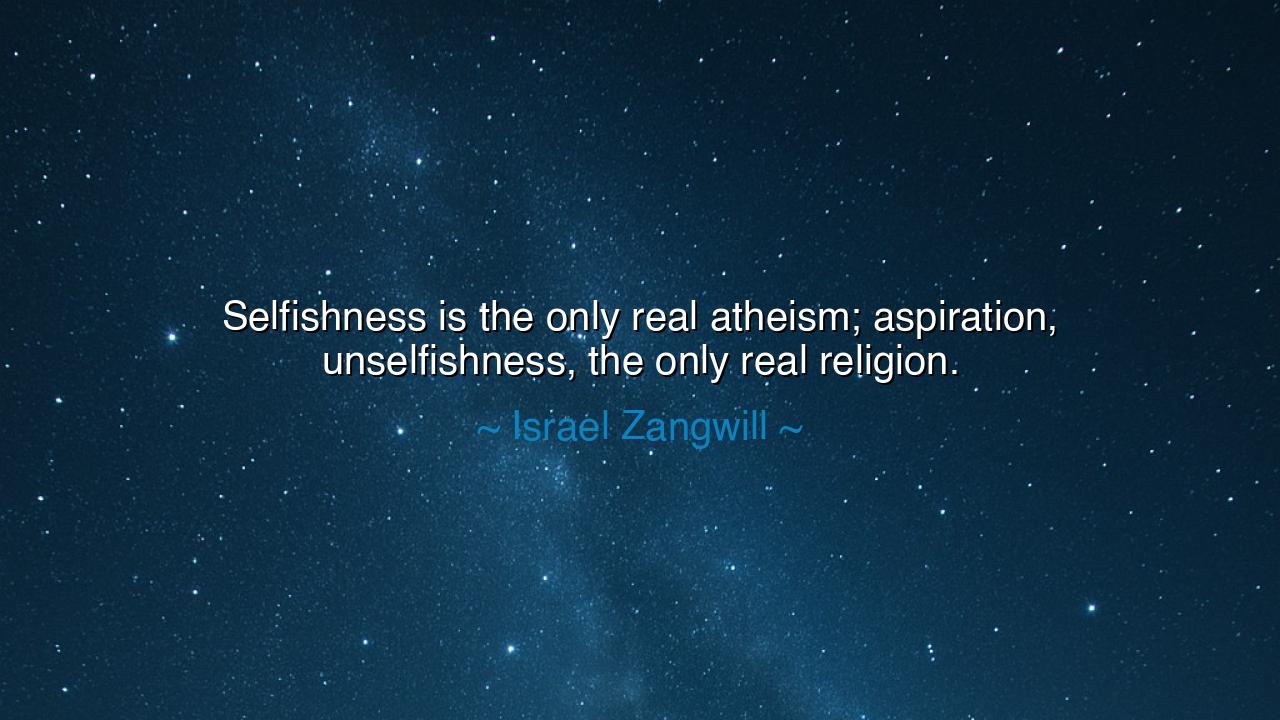
Selfishness is the only real atheism; aspiration, unselfishness
Selfishness is the only real atheism; aspiration, unselfishness, the only real religion.






In the vast theater of life, where the roles we play are dictated by both our inner desires and external forces, one truth rings clear, as Israel Zangwill so eloquently put it: "Selfishness is the only real atheism; aspiration, unselfishness, the only real religion." These words carry the weight of wisdom that echoes through the ages, reminding us of the spiritual path that lies before us, a path that requires us to rise above the base instincts of selfishness and embrace the higher calling of unselfishness. Zangwill’s statement lays bare the very essence of human purpose: that true faith is not measured by rituals or belief in deities, but by the way we live our lives in service to others.
Selfishness, as Zangwill reveals, is not merely the absence of faith; it is the denial of a higher purpose. It is the soul that seeks only to feed its own desires, to build walls around itself, rejecting the sacred bond between all beings. In this light, selfishness is, in its most profound sense, a form of atheism—not in the literal rejection of a deity, but in the rejection of the divine principles that bind humanity together. It is the narrow-mindedness that closes the heart to the suffering of others, the blindness that fails to see the divinity in every human being. For what is faith, if not a recognition that we are all part of something greater than ourselves? Selfishness, in this regard, becomes a rejection of that truth, a turning away from the sacred interconnection of all life.
Throughout history, great souls have shown us that aspiration—the yearning to reach for something higher, something greater—forms the true heart of religion. Take, for example, the life of Mahatma Gandhi, whose spiritual journey was not one of passive belief, but of active unselfishness. Gandhi’s quest for Indian independence was not driven by personal gain or glory, but by a deep desire to serve his people, to uplift them from the shackles of colonialism. His life was a testament to the power of selflessness, the ability to place the needs of others above one’s own. Through his principle of ahimsa (non-violence), Gandhi aspired to create a society that was founded on love, respect, and unity. In this way, his life was not only a pursuit of political freedom but a spiritual journey in which unselfishness and aspiration were his guiding lights.
Consider the ancient teachings of Buddhism, which emphasize the path of selflessness as the way to transcend suffering. The Buddha himself taught that the cessation of suffering is found not through personal gain or desire, but through the practice of compassion and the release of attachment. In his teachings, the true religion was not in blind worship, but in the aspiration to overcome the ego, to free oneself from the chains of selfishness and become a vessel of peace and love. The noble eightfold path, which is the foundation of Buddhist practice, is a roadmap of unselfishness, teaching us to live with right understanding, right speech, right action, and right livelihood—each of these principles moving us away from the self-centered ways of the world toward a higher spiritual existence.
In our modern world, we are bombarded with countless distractions, many of which encourage selfishness—the pursuit of wealth, fame, and personal pleasure. Yet, as Zangwill reminds us, these pursuits, while often tempting, are hollow when viewed through the lens of true faith. Selfishness is a fleeting satisfaction, a fleeting sense of control, but it offers no lasting peace or fulfillment. True aspiration lies in the service of others, in the desire to contribute to the greater good, in the unselfish pursuit of love and compassion. It is in the act of giving, of putting others before ourselves, that we discover the deepest meaning of life. Just as Mother Teresa devoted her life to serving the poorest of the poor, we, too, can find profound spiritual satisfaction in the simple, everyday acts of kindness and generosity.
Zangwill’s lesson is clear: selfishness may promise quick rewards, but it leads only to emptiness, for it is the denial of faith in the highest principles of life. Aspiration, on the other hand, is the true religion, for it leads us to a life of purpose, of service, and of deep connection to the divine. We must ask ourselves: Are we living for ourselves, or are we living for something greater? Are we driven by personal desires, or are we aspiring to live with unselfishness and love, with a heart that seeks to heal and uplift those around us?
In the end, the greatest religion is not a set of rituals or dogmas; it is a life lived in service to others, a life that aspires to reach beyond the self. Let us live with the unselfishness that Zangwill describes, aspiring each day to rise above our lower instincts and toward the divine light of love and compassion. May we, too, recognize that the true measure of our faith is not in what we believe, but in how we live—how we choose to place the needs of others above our own, and how we strive to make the world a better place, not for ourselves, but for all.






AAdministratorAdministrator
Welcome, honored guests. Please leave a comment, we will respond soon